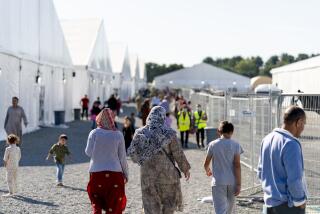Afghan Path to Peace Goes Through India, Pakistan
- Share via
WASHINGTON — To the cautious relief of their neighbors, nuclear adversaries India and Pakistan agreed last week to new peace talks. They have been down this road before, rarely with success. But another -- and unlikely -- source of good news in the region gives impetus to the India-Pakistan discussions. Afghanistan’s new constitution could mean that the country stands a chance of triumphing over South Asia’s divisive history -- if durable peace comes to the region.
Against a backdrop of occasional exploding bombs in the hills behind Kabul, security alerts that brought the city to intermittent standstills and mistaken targeting by U.S. forces that killed children rather than terrorists, Afghanistan’s convocation to write a constitution could easily have degenerated into old recriminations and new animosities. Stop and start it did, but civic debate finally produced a road map for this summer’s elections and the country’s broader political future.
Can Afghanistan be governed with its new constitution? In theory, yes. President Hamid Karzai got the document he and his U.S. patrons wanted, granting him substantial authority. Opposition groups secured parliamentary powers to protect and strengthen dissident voices, women participated actively and won rights, and ethnic minorities finally have political standing in their own languages.
In practice, however, Afghanistan’s war-torn history lives on in the constitution. The moujahedeen who took over after the Soviet Union’s army withdrew, and who many Afghans believe ruined the country, dominated constitutional proceedings. Former proxies of foreign powers and now patronized by the U.S.-led anti-terror coalition, some are Cabinet members and others prosper in an economy lubricated by narcotics, corruption and insurgency. Many bribed their way into the loya jirga, or constitutional assembly, and bristled when they were criticized. Others will try to force their way into parliament and, by doing so, will shave away the fairness of future elections. If violence continues to infect the election process -- and possibly even postpone voting -- the constitution’s legitimacy will be jeopardized.
But peace in Afghanistan will require more than a constitution. It will need goodwill across the region, political vision from its leaders and a civil environment. Karzai has been severely tested by the continuing conflict, the anti-terrorism interests of foreign armies and the legacy of war-imposed poverty. He must now take charge of running the state. The restive Afghan electorate wants results from the government -- in development and reconstruction -- and seeks protection from authoritarian warlords. Karzai will need to prove himself by recalibrating the relationships among foreign patrons -- many of whom view him as their insurance against extremism and want to ensure his election as president -- and a vital, forthright, often contentious Afghan polity whose political preferences are unknown.
If Afghanistan is to stand on its own feet, its tattered civil service will have to be retrained to assume the responsibilities of a modern state, and Afghanistan’s government will have to ensure that this happens. Afghans will have to learn to run financial institutions for the private sector to prosper -- and the government will have to make this happen, too.
Children are learning to read, but their teachers are often only a few steps ahead of them. Publicly financed colleges and universities barely exist -- no texts, no libraries, no laboratories, no heat, and barely enough trained faculty. Private funds are needed to revive them if Afghans can become engineers or doctors and contribute to national reconstruction.
There are signs that change is at hand, but without sustained investment it will remain unfinished. Two years ago, Kabul’s bleak landscape included miles of rubble. Today, houses and office complexes are rising, often without official assistance and far ahead of necessary water and sewage systems. Markets are full of merchandise -- new cameras compete for space with used clothing, beggars share stalls with moneylenders -- but Afghans will starve if poppy cultivation continues to take precedence over growing food. Thousands of Afghans are burrowing into jerry-built private schools to learn English and technology skills, but they don’t yet have jobs or computers or, usually, electricity to run them.
The timetable for development -- not just survival -- is urgent. It must come soon enough to tap postwar enthusiasm, protect Afghans against resurgent fighting and deepening poverty, and reasonably balance private enterprise and state responsibility.
Afghanistan’s politics meet the country’s economy at the heart of its new constitution, and this is also where the needs of Afghans and the interests of their neighbors converge. The “composite” security issues that Indian Prime Minister Atal Behari Vajpayee and his Pakistani counterpart, Zafarullah Khan Jamali, outlined must include far more than resolving their Kashmir dispute. For peace to emerge in South Asia, all borders must be respected, including the porous one between Afghanistan and Pakistan, which has long invited meddling from governments, guerrillas and smugglers. Afghanistan’s nascent constitutional order will not succeed if India and Pakistan continue their brinkmanship on Afghanistan’s periphery.
After the Indo-Pakistani talks, Pakistani President Pervez Musharraf announced, “victory is to the moderates in India and moderates in Pakistan.” But India cannot preach tolerance to Afghanistan while its ruling party encourages violent sectarian schism at home. And as long as Pakistan’s leaders malign their constitution, they endanger democracy’s chances across the border in Afghanistan.
For too long, Afghanistan’s fate has been tied to bitter contests between India and Pakistan. South Asia’s instability has too often cost Afghanistan a chance for peace. The best opportunity for a real truce may finally have arrived.
More to Read
Sign up for Essential California
The most important California stories and recommendations in your inbox every morning.
You may occasionally receive promotional content from the Los Angeles Times.













